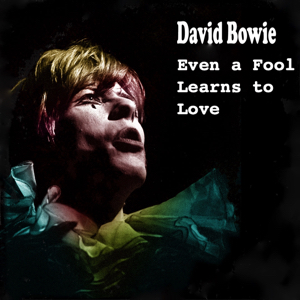David Bowie Even a Fool Learns to Love (restored) Demo 4:13 min.
The Origins Of My Way
David Bowie was the first person to write English lyrics to the original tune of what eventually became the global hit, My Way. Claude Francois, a big name in his native France, wrote and performed the original song called, Comme d’habitude which means ‘As Usual.’ It was quite common in the 60s for European hits to be picked up by British or American publishers, who would in turn commission somebody to apply an English lyric to the tune. You Don’t Have to Say You Love Me by Dusty Springfield is a good example, it was originally an Italian hit. The European publisher would make money from the re-version, the Brits and the American publishers would make money, so everybody ate.
In 1968, David Jones (aka David Bowie) was a jobbing song writer who was employed by music publishers in Denmark Street, London. Bowie hadn’t yet found the persona that he was to become famous for but his influences were beginning to point in that direction. Bowie was a huge admirer of Anthony Newley. Today, Newley is a bit of a forgotten name but he was massive when Bowie was growing up. Continually on television, he was a renaissance man – acting in films from his teens (he was the Artful Dodger in David Lean’s Oliver Twist), a natural comic, intelligent, had chart hits and married Joan Collins. In his late twenties he moved from teen pop into grander propositions, he wrote and starred in a new form of musical, a kind of British equivalent of Sondheim. The lyrics Bowie wrote in Even a Fool Learns to Love to Claude Francois’ Comme d’habitude echo the elegiac style and melancholic sentiments of Newley in that mode.
Unreleased Bowie Song
During the production of Arena: My Way in late 1978, Bowie’s lyrics to Comme d’habitude came our way as a real curiosity. Ken Pitt had been Bowie’s manager when Alan Yentob made his celebrated documentary, Cracked Actor, about Bowie 3 years earlier. We met Ken in his office in Oxford Street where upon he produced an audio tape with Bowie singing Only a Fool Learns to Love. Not organising an orchestra or even a band, Bowie had simply played the Claude Francois song at home and recorded his own version over the top in time to the French lyrics. Ken Pitt also furnished us with a video that Bowie had somehow managed to get made. Performing a different song, Bowie wears a sea green suit with white braiding around the lapels and sings to a girl who’s wearing a wafty floral dress in a wood in the mist – you can literally see the Vaseline around the lens. It’s spectacularly drippy, no hint whatsoever of the icy steel of the thin white Duke in years to come.
David Bowie’s version of Comme d’habitude was never released. His following single was Space Oddity which was released in 1969, the same year that Paul Anka’s version of the French hit exploded into one of the most successful songs of all time.
Ideas & Influences of My Way
In the autumn of 1978 I’d just arrived at Arena as a Researcher. Leslie Megahey, a very distinguished arts film documentary maker had run the series and had just handed it over to Alan Yentob. Nigel Finch was already working on Arena as a director.
At the time I was also writing about rock music, the idea for a film came to me when I received an advance copy of the Sex Pistols performing their version of the song. On hearing Sid Vicious I thought there’s got to be something in this, it sounded absolutely fantastic and of course for those who were sympathetic to it you could hear
We played the Sex Pistols version to Dorothy Squires, the Welsh singer who features in the film, who hadn’t heard it before. The song was as much her signature tune as Sinatra’s. Dorothy’s words were, ‘He should be crucified, he should have been crucified before he crucified that song.’ I was also aware that George Brown, who was the Foreign Minister in the Wilson administration in the 60s, had named his biography In My Way, he even quotes the song at the beginning of the book. Like Squires, George was famous for being forever eight sheets to the wind in public. I knew George Brown had an obsession with the song from a friend of mine who moved in Labour circles and worked for ASTMS, a left wing union of the time. Through his political connections, my friend had witnessed George Brown drunk at a diner, trying to recite the words to My Way and clearing the room with the attempt.
Today, it’s as common as muck for people to make films about songs but at the time people would say to us, ‘How can you make a film about a song? Just one song?’ But of course all these recordings and anecdotes were flooding the office and we were saying ‘It’s surprisingly easy!’
My Way dealt with popular culture in a completely unashamed, unabashed way, the film was clearly coming right from inside the song and what it meant to people, not looking upon it in any kind of patronising, or even an intellectual way like John Berger or Warhol. It was full of light-entertainment performances and there seemed to me to be a very, very, thin line between Shirley Bassey surrounded by Doric columns in an existential light-entertainment spotlight, dressed like a Greek goddess and say Janet Suzman giving her all as Cleopatra on stage at the National Theatre.
Overnight, My Way formed a kind of genre that enabled Nigel Finch and I to work on a number of other Arena films along the same lines, the two most successful were, The Ford Cortina and Desert Island Discs. It was acknowledged that they represented a new style distinctive to Arena. Like anything that breaks new ground, it started to corrupt itself and we were getting endless suggestions for films about the light bulb, the Land Rover or the Girl Guides. This missed the point by taking the subjects only at face value, the original films represented an attitude – what did these phenomena really represent and signify – where were they coming from.
My Way was first broadcast on 12th March 1979, BBC Two
Anthony Wall is the Series Editor of Arena.
David Bowie ( David Robert Jones ) Even A Fool Learns To Love
There was a time, the laughing time
I took my heart to every party
They’d point my way
‘how are you today?’
‘will you make us laugh? chase our blues away?’
Their funny man won’t let them down
No, he’d dance and prance and be their clown
That time, the laughing time
When even a fool learns to love
The clown turned around
And saw her smile, oh how she loved me
She’d clap her hands and beg me stay
To make her laugh, to make her life gay
Who wants the love of all the world
When here was love in the eyes of just one girl
That day, that precious day
When even a fool learns to love
But oh, how i dreamed, a marvelous dream
Where all of the heavens or so it had seemed
With thunderous applause looked down from above
Find more lyrics at ※ Mojim.com
On a clown and an angel so much in love
I’ll stay with my dream, it takes such a dream
And even a fool learns to love
That day, that hateful day
The joke turned stale, the game was over
Those spiteful words ‘oh, go away. who wants to play?’
‘it’s getting late now.’
My world, my funny world
Had lost its mask and shown a broken heart
A time, a sour time
When even a fool learns to love
But oh, how i dreamed, a marvelous dream
Where all of the heavens or so it had seemed
With thunderous applause looked down from above
On a clown and an angel so much in love
I’ll stay with my dream, it takes such a dream
And even a fool learns to love



